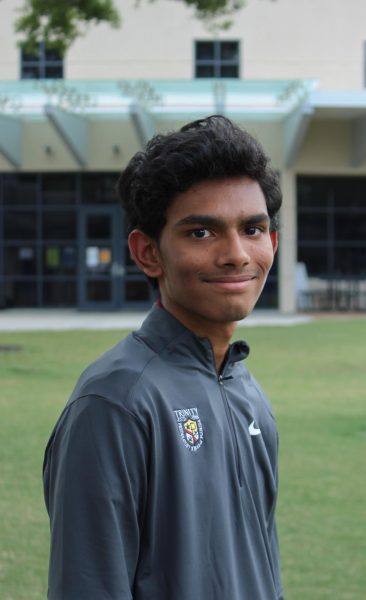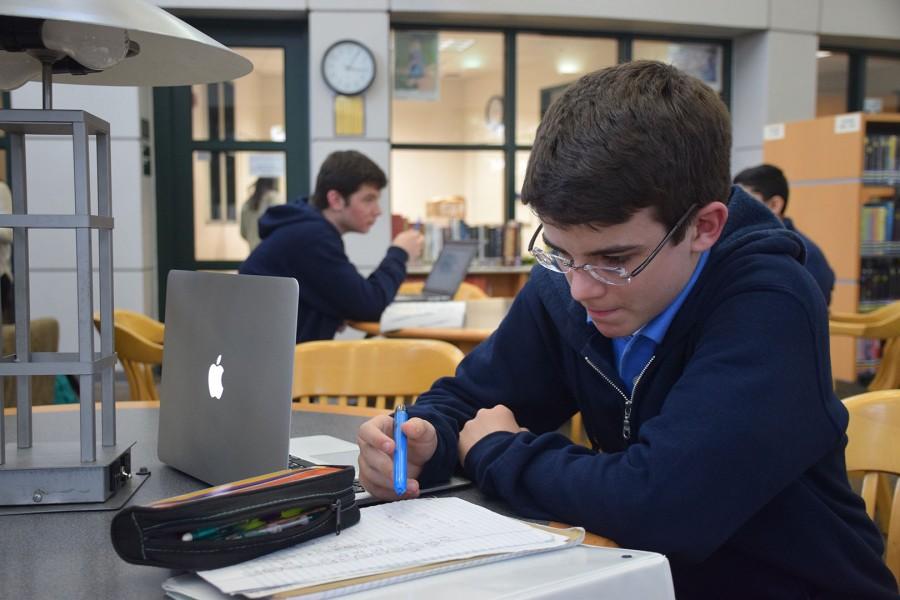Mandatory homework has long been lauded as an aid to learning. And it certainly is one: a Band-Aid. Unfortunately, a deeper issue lies beneath.
“The primary purpose (of homework) is to practice and reinforce skills and concepts that we’re going over in class,” Head of Middle School Stephanie Dryden said.
Offering students that opportunity to strengthen their understanding is great. However, as students age, mandatory homework becomes not only a hassle for the students who do not need it but also a shortsighted handholder for those who do. Thus, it must be phased out in high school in favor of optional assignments to be completed as needed.
Any work required at home should add something the student could not have gotten during the school day. Assigning at-home reading, for example, is appropriate because it prepares a student to adequately engage in class.
Mandating a whole worksheet consisting solely of previously covered material is not. Though the assignment might be valuable, the onus must be on students to decide when they feel comfortable enough with the topic. For some, this may look like three more packets; for others, it may be none.
“Once you’ve got the concept (and) you can do it, then it’s just rinse and repeat,” science teacher Elmarie Mortimer said. “If a student has a skill, then I’m not going to punish them for getting outside and getting fresh air and enjoying life (instead of) just sitting there, showing me over and over that they have that skill.”
The only reason for a student to complete 15 additional math problems on a topic they have already mastered is to avoid a zero in the gradebook. When this drudgery becomes unbearable, students turn to quick solutions, nullifying the goal of extra practice.
“(Many students) who do the homework now when it’s mandatory still don’t learn it,” senior Katia Lyakh said. “They just cheat (on) it. They’ll run it through their calculator or through Chat(GPT).”
Furthermore, while a deadline and grade may be necessary to keep younger students on track, maintaining that rigidity through all of high school inhibits them from figuring out how to learn on their own accord. An endless torrent of mandatory homework does not build competence; it builds dependence.
“Twelve-year-olds (are) not so autonomous,” English teacher Hannah Schuttler said. “But at 16, 17, 18 … you’re at that point in your life where you are going to become a person who makes your own choices in a year and a half, which is awesome and exciting, but we also need to prep for that.”
Still, many older students remain uncomfortable with the idea of their work being voluntary, fearing they lack the intrinsic motivation to do it.
“If homework was optional when I was in high school, I wouldn’t have done it, which would have been very bad for my learning,” Class of 2023 alumnus Andrew Lopez said. “If someone hears ‘No homework,’ they’re not doing homework.”
In that case, most high schoolers either do not see the underlying educational purpose of homework or do not care enough to apply that purpose to their own lives. Both are issues we ought to address.
Mandatory homework may boost short-term learning outcomes, but it does so at the expense of instilling a lasting desire for mastery. Without the decision on their shoulders, students will not learn to appreciate the value of the work that exists for their own benefit.
“We call ourselves a preparatory school,” Mortimer said. “We’re preparing you for life, and in life … that is a big thing, that skill of ‘This I can do. I don’t have to worry about it. This I can’t do. I need more help with (it).’”
Lopez, however, believes that mandatory homework is a necessary component of the college preparatory process. As a current junior at Vanderbilt University, he now has a much greater workload than he did in high school, and most of it is still required.
“Something I’ve seen being at a top school is that a lot of students in high school who were at the top of their class … have to transition into doing a lot more work, and that is something that is super challenging for them,” Lopez said. “I think that administrators and faculty members have the foresight to see that (and) students don’t, because I didn’t.”
We must consider the tradeoff: Is it best that we focus on shaping students to thrive in a college setting if that sacrifices the real lesson? In the long run, the choices that determine our lives are the ones we make with no one forcing us. Until students realize that, they are not pursuing excellence. They are pursuing a deadline.
For students’ good, we should start to shift away from mandatory homework in ninth grade, gradually transitioning into an entirely optional homework scene by junior year. Most students at that age have been exposed to advanced classes and committed their out-of-school time to specific passions.
“Junior (and) senior year, make it optional so people have the time to study for what they need to study for (and the time for) extracurriculars,” sophomore Lucas Le Douaron said. “Some people might be going for scholarships in sports or debate, and that interference from homework kind of stunts that.”
Across all grades, students should reflect on their workload and reach out to their teachers to discuss how it could better suit where they are in the learning process.
“I think we’re a small enough school and a strong enough community that those kinds of conversations can happen,” Dryden said. “It’s about bringing the ‘why’ to the fore. … If I haven’t made that ‘why’ clear, then whatever I’ve assigned can be vulnerable to the tag ‘busywork.’”
Once students make an effort to understand the purpose of their work — and actively make the choice of whether that purpose is in line with their current needs — they can start to allocate their time according to what will actually be of value to them and not just what their Canvas calendar commands.
Mortimer somewhat takes this approach with her AP Physics classes, where she assigns minimal required homework but offers ample optional practice problems for students to complete as they wish.
“I really liked the way that Dr. Mortimer did homework,” Lopez said. “I never did (the extra problems) in Physics 1. (But) in Physics 2, I realized, ‘OK, I need to do these problems because I don’t understand everything well enough with just doing regular homework.’”
There will inevitably be students whose performance goes down without forced reinforcement. Ideally, this would be a wake-up call encouraging them to think more deliberately about their learning. However, if certain students are unable to recover on their own, required homework can be reintroduced until they are back on track.
Trinity already has a successful program that follows this model: study period. Any student can choose to attend a teacher’s study period, but it becomes mandatory when their grade drops below a certain threshold. A similar policy for homework would allow students to manage how they learn outside of class while retaining the guardrails of structure for students at risk of failing.
Implementing this system will take work. But it is time to rip off that Band-Aid — because real learning is more than skin-deep.
Home Away from Homework
Mandatory homework should be phased out
Categories:
Bergman intently focuses on finishing his math homework.
0
Navigate Left
-
 OpinionsDress to Impress
OpinionsDress to Impress -
 OpinionsPlaque Attack
OpinionsPlaque Attack -
 OpinionsSchedule Lacks Class
OpinionsSchedule Lacks Class -
 OpinionsAn Active Problem
OpinionsAn Active Problem -
 OpinionsFeedback Reform
OpinionsFeedback Reform -
 OpinionsHot Topic
OpinionsHot Topic -
 OpinionsRepresentation Made Real
OpinionsRepresentation Made Real -
 OpinionsOppression On Every Plate
OpinionsOppression On Every Plate -
OpinionsGrade A Problem
-
OpinionsCommentaaron
Navigate Right
About the Contributors

Ashwin Anand, Managing Editor
Ashwin Anand is a junior entering his second year on staff. He currently serves as a managing editor and is working hard to balance his paternal duties to the STEM department with his first love: opinions. Outside the newsroom, you might spot him corralling middle schoolers as Latin Club’s benevolent dictator, flying out for forensics or swearing he’ll actually eat lunch today — all while his phone buzzes from Jack Aaron’s third call within the last 30 seconds. Contact him at [email protected].

Julia Orr, Staff Photographer
Julia Orr is a photographer entering her second year on The Trinity Voice and her third year at Trinity. When she is not retaking photos to get better angles or coming up with witty headlines for her fellow staffers, Julia enjoys competing on the debate team, volunteering with dogs and running track. She has a passion for traveling, and Julia’s favorite place she has journeyed is Fiji.




